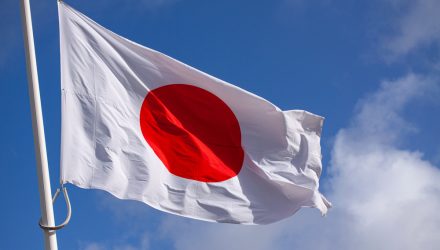After a multidecade bout with deflation, Japan is finally experiencing some incremental inflation. Unlike the U.S., rising consumer prices could benefit stocks in Asia’s third-largest economy.
Adding to the case for the WisdomTree Japan Hedged Equity Fund (DXJ) is the point that, while inflation is perking up in the Land of the Rising Sun, the Bank of Japan is unlikely to raise interest rates anytime soon. As such, the yen has continued slumping against the dollar this year, bolstering the outlook for currency-hedged exchange traded funds with exposure to Japanese stocks — an asset class dominated by DXJ.
This year, DXJ is doing its job with aplomb. As of Octpber 23, the WisdomTree ETF is up an impressive 34.7%, well ahead of the 7.3% returned by the unhedged MSCI Japan Index. The ETF is also outpacing the S&P 500 by a margin of better than 3-to-1.
Why Japan Inflation Could Help DXJ
While Japan has long had one of Asia’s most liquid and vibrant equity markets, it’s also one that many local retail investors have long ignored or remained under-allocated to. However, with inflation taking shape, those market participants may have no choice but to pull out of bonds and cash, and get involved with equities — a scenario that could benefit DXJ member firms.
“Consumers are also likely to move their savings from bank deposits, which pay virtually no interest, to higher-yielding assets. According to the Bank of Japan (BOJ), Japanese households held some 2,043 trillion yen of financial assets as of the end of March, 54% of which were in bank deposits and just 11% in equities. Even a small change in those percentages can translate into huge stock market inflows; a major expansion of Japan’s individual saving account scheme, nicknamed NISA, in 2024 makes this a distinct possibility,” according to AllianceBernstein research.
Another factor that could work to DXJ investors’ favor is the combination of inflation and Japanese companies’ sizable cash hoards. Amid rising inflation, management teams are likely aware of the fact that shareholder rewards — buybacks and dividends — can keep investors engaged with equities.
“Corporations must also do something with their cash piles. Companies representing 53.5% of Japan’s market capitalization had a net cash position on their balance sheets at the end of 2022, compared with 39.4% in the US and 22.8% in the Eurozone,” concluded AllianceBernstein. “Dividend payouts and stock buybacks, which both return cash to shareholders, had already been increasing over the past decade, but—more importantly—we believe that inflation will make it easier for management to find ways to better reinvest cash to grow their businesses.”
For more news, information, and analysis, visit the Modern Alpha Channel.








